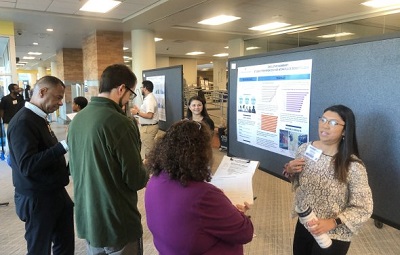Description/Abstract/Artist Statement
Students in juvenile detention centers have the greatest need to receive improvements in educational delivery and content; however, they are one of the “truly disadvantaged” populations in terms of receiving those improvements. This work presents a qualitative data analysis based on a focus group meeting with stakeholders at a local Juvenile Detention Center. The current educational system in juvenile detention centers is based on paper worksheets, single-room style teaching methods, outdated technology, and a shortage of textbooks and teachers. In addition, detained students typically have behavioral challenges that are deemed "undesired" in society. As a result, many students miss classes and exams that count towards their grades. Furthermore, many students are under-performing on standardized tests, resulting in lower graduation rates. As a primary theme from the qualitative data analysis using NVivo, we identified vocational training as a high-need area for detained students. Thus, we propose developing an offline and interactive learning module environment for students to receive high-quality STEM education. Since juvenile detention centers do not incorporate technology into their educational systems due to security concerns from student delinquent behavior, it is important to incorporate technology into their educational systems to increase student engagement and problem-solving skills.
Faculty Advisor/Mentor
Sampath Jayarathna
Faculty Advisor/Mentor Department
Computer Science Department
College Affiliation
College of Sciences
Presentation Type
Oral Presentation
Disciplines
Cognitive Science | Curriculum and Social Inquiry | Data Science | Elementary and Middle and Secondary Education Administration | Elementary Education and Teaching | Information Security | Junior High, Intermediate, Middle School Education and Teaching | Online and Distance Education | Other Teacher Education and Professional Development | Pre-Elementary, Early Childhood, Kindergarten Teacher Education | Programming Languages and Compilers | Theory and Algorithms
Session Title
College of Sciences 2
Location
Learning Commons @Perry Library, Room 1311
Start Date
3-30-2024 9:30 AM
End Date
3-30-2024 10:30 AM
Upload File
wf_yes
Included in
Cognitive Science Commons, Curriculum and Social Inquiry Commons, Data Science Commons, Elementary and Middle and Secondary Education Administration Commons, Elementary Education and Teaching Commons, Information Security Commons, Junior High, Intermediate, Middle School Education and Teaching Commons, Online and Distance Education Commons, Other Teacher Education and Professional Development Commons, Pre-Elementary, Early Childhood, Kindergarten Teacher Education Commons, Programming Languages and Compilers Commons, Theory and Algorithms Commons
Improving Educational Delivery and Content in Juvenile Detention Centers
Learning Commons @Perry Library, Room 1311
Students in juvenile detention centers have the greatest need to receive improvements in educational delivery and content; however, they are one of the “truly disadvantaged” populations in terms of receiving those improvements. This work presents a qualitative data analysis based on a focus group meeting with stakeholders at a local Juvenile Detention Center. The current educational system in juvenile detention centers is based on paper worksheets, single-room style teaching methods, outdated technology, and a shortage of textbooks and teachers. In addition, detained students typically have behavioral challenges that are deemed "undesired" in society. As a result, many students miss classes and exams that count towards their grades. Furthermore, many students are under-performing on standardized tests, resulting in lower graduation rates. As a primary theme from the qualitative data analysis using NVivo, we identified vocational training as a high-need area for detained students. Thus, we propose developing an offline and interactive learning module environment for students to receive high-quality STEM education. Since juvenile detention centers do not incorporate technology into their educational systems due to security concerns from student delinquent behavior, it is important to incorporate technology into their educational systems to increase student engagement and problem-solving skills.


